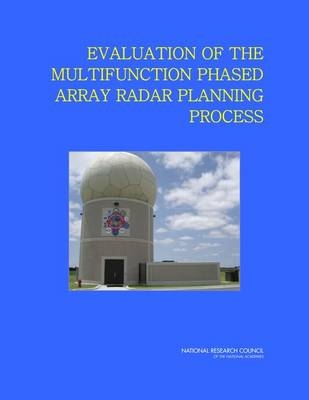
Evaluation of the Multifunction Phased Array Radar Planning Process
Seiten
2008
National Academies Press (Verlag)
978-0-309-12432-4 (ISBN)
National Academies Press (Verlag)
978-0-309-12432-4 (ISBN)
The Multifunction Phased Array Radar (MPAR) is one potentially cost-effective solution to meet the surveillance needs and of several agencies using radar networks. This book analyzes what is lacking in the system, the relevant capabilities of phased array technology, technical challenges, cost issues, and compares possible alternatives.
The Multifunction Phased Array Radar (MPAR) is one potentially cost-effective solution to meet the surveillance needs and of several agencies currently using decades-old radar networks. These agencies including the National Oceanic and Atmospheric Administration s (NOAA) National Weather Service (NWS), the Federal Aviation Administration (FAA), the Department of Defense (DOD) and the Department of Homeland Security (DHS) have many and varied requirements and possible applications of modern radar technology.
This book analyzes what is lacking in the current system, the relevant capabilities of phased array technology, technical challenges, cost issues, and compares possible alternatives. Both specific and overarching recommendations are outlined.
Table of Contents
Front Matter
Summary
1 Introduction
2 Overview of the Current National Radar System
3 Needs for the Next Generation System
4 Capabilities of Phased Array Radar
5 The MPAR Concept
6 The MPAR Planning Process
7 Evaluation of the Planning Process
8 Family of Systems
9 Concluding Thoughts
References
Appendix A STATEMENT OF TASK
Appendix B ACRONYM LIST
Appendix C BIOGRAPHICAL SKETCHES OF COMMITTEE MEMBERS AND STAFF
The Multifunction Phased Array Radar (MPAR) is one potentially cost-effective solution to meet the surveillance needs and of several agencies currently using decades-old radar networks. These agencies including the National Oceanic and Atmospheric Administration s (NOAA) National Weather Service (NWS), the Federal Aviation Administration (FAA), the Department of Defense (DOD) and the Department of Homeland Security (DHS) have many and varied requirements and possible applications of modern radar technology.
This book analyzes what is lacking in the current system, the relevant capabilities of phased array technology, technical challenges, cost issues, and compares possible alternatives. Both specific and overarching recommendations are outlined.
Table of Contents
Front Matter
Summary
1 Introduction
2 Overview of the Current National Radar System
3 Needs for the Next Generation System
4 Capabilities of Phased Array Radar
5 The MPAR Concept
6 The MPAR Planning Process
7 Evaluation of the Planning Process
8 Family of Systems
9 Concluding Thoughts
References
Appendix A STATEMENT OF TASK
Appendix B ACRONYM LIST
Appendix C BIOGRAPHICAL SKETCHES OF COMMITTEE MEMBERS AND STAFF
Committee on the Evaluation of the Multifunction Phased Array Radar Planning Process; National Research Council
1 Front Matter; 2 Summary; 3 1 Introduction; 4 2 Overview of the Current National Radar System; 5 3 Needs for the Next Generation System; 6 4 Capabilities of Phased Array Radar; 7 5 The MPAR Concept; 8 6 The MPAR Planning Process; 9 7 Evaluation of the Planning Process; 10 8 Family of Systems; 11 9 Concluding Thoughts; 12 References; 13 Appendix A STATEMENT OF TASK; 14 Appendix B ACRONYM LIST; 15 Appendix C BIOGRAPHICAL SKETCHES OF COMMITTEE MEMBERS AND STAFF
| Erscheint lt. Verlag | 14.9.2008 |
|---|---|
| Verlagsort | Washington |
| Sprache | englisch |
| Maße | 216 x 279 mm |
| Themenwelt | Naturwissenschaften ► Geowissenschaften ► Geologie |
| Naturwissenschaften ► Geowissenschaften ► Meteorologie / Klimatologie | |
| ISBN-10 | 0-309-12432-8 / 0309124328 |
| ISBN-13 | 978-0-309-12432-4 / 9780309124324 |
| Zustand | Neuware |
| Informationen gemäß Produktsicherheitsverordnung (GPSR) | |
| Haben Sie eine Frage zum Produkt? |
Mehr entdecken
aus dem Bereich
aus dem Bereich
Baugruben und Gründungen
Buch | Hardcover (2024)
Springer Fachmedien Wiesbaden GmbH (Verlag)
59,99 €


